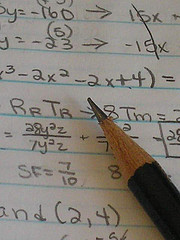Music adds such a level on enjoyment and creativity to life. As the Choir Director at Mad River Middle School, Tiffany Hesselbart sees this firsthand. In this field, it is essential for Tiffany and her students to understand basic math. Although math skills cannot give you a better singing voice, it may help those who already sound beautiful when they sing!
Can you explain what you do for a living?
I teach seventh-grade choir. I have approximately 140 students split between 4 classes.
When do you use basic math in your job?
Math is very important in music so we use it every day. We talk about the number of beats in each measure. We talk about the values of different types of notes and rests. For example, I may ask the class what the value of a quarter note is, and when they say one beat, I ask them what happens to the note if it has a dot on it. They have to know that a dot equals half of the value of the no, and that it would then equal one and one half beats. In addition, we talk about how two eighth notes equal one quarter note, two quarter notes equal one half note, and two half notes equal one whole note.
Do you use any technology (like calculators or computers) to help with this math?
Our math is basic fractional math that does not require a calculator.
How do you think math helps you do your job better?
Math and music go hand in hand. I explain to students every day that they need to understand fractions in order to understand music. If I could not explain that to students, then they would not understand many aspects of music. So it not only helps me do my job better, it is absolutely essential.
How comfortable with math do you feel?
I am comfortable with math that I use every day, but math is not my strong suit.
What kind of math did you take in high school?
I took algebra 1 and 2 in high school. Also, I took geometry. I think that I was good at it them because I was in accelerated math. However, when I took math in college, I realized I was not as good at it as I had originally thought.
Did you have to learn new skills in order to do the math you use in your job?
No, the math I use daily is basic math that middle schoolers can understand so that I can meet my teaching and learning goals with them.
So, when Tiffany’s students utilize their basic math skills in choir, I bet it is music to her ears. If you have questions for Tiffany, send them my way, and I will be happy to send them to her!
Photo Credit: Brandon Giesbrecht via Compfight cc



